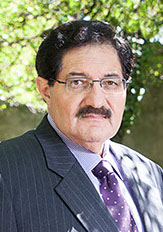
Fostering the#Heretolead Generation
ABOUT US |
The challenges our country faces---Latino and immigrant communities in particular---are too complex and convoluted for any one group to tackle alone. Our nation now more than ever needs leadership and perspective that mirrors our increasingly diverse population and nuanced realities faced by all.
Since 1978, the Congressional Hispanic Caucus Institute (CHCI) mission has been to develop the next generation of Latino leaders---ensuring a diverse and inclusive America. And as we celebrate the Institute’s 40th anniversary, we recognize the magnitude of our mission and how much work lies ahead.
Latino leaders---ensuring a diverse and inclusive America. And as we celebrate the Institute’s 40th anniversary, we recognize the magnitude of our mission and how much work lies ahead.
Robert Kennedy once said, “Ultimately, America’s answer to the intolerant man is diversity.”
Robert Forty years ago, three visionary Latino members of Congress founded CHCI because they were committed to increasing Latino representation on Capitol Hill and across industries. Establishing CHCI was a way to combat bigots, racists, and those who perpetuate social inequality. Through the exemplary actions of these emerging leaders, a new Latino American narrative would be celebrated and replicated among our Latino community, even when others minimized our progress.
Today’s landscape certainly differs than that of 40 years ago with there now being 39 Latino members in Congress and a clear increase in pursuing leadership and higher education amongst our community. College enrollment rate for Latino students has gone up from 49 percent in 2000 to 71 percent in 2016. We have witnessed an incline in Latino representation in the corporate boardroom and Latino-owned businesses in the U.S. fueling economies and creating jobs across the nation.
While we celebrate our collective successes, Latinos still experience significant barriers - in higher education, in wealth creation, and political empowerment. While more Latino students are pursuing higher education, for many, economic factors remain an obstacle. In 2014, 66 percent of Latinos who got a job, or entered the military directly after high school cited the need to help support their family as a reason for not enrolling in college. Moreover, Latinos among the lowest of groups to obtain a four-year degree.
Latinos also comprise an average of nearly 15 percent of the total reported employee base with about 7 percent of Latinos holding board seats among Fortune 500 companies and 4 percent of all executive positions.
Latinos now account for 18 percent of the nation’s population and are the nation’s fastest-growing ethnic segment. By 2060, one in three U.S. residents will be Latino.. This accelerated growth demands that we collectively support our Latino youth with the tools, education and leadership training needed to ascend to the upper echelons of society. The economic vitality of our nation is tied to the success of U.S. Latinos.
We are living in a critical moment. Latinos need to be seated at the power table where the decisions are made about our civil rights, our education, and the future of this country. Otherwise, without representation, it is a slippery slope that can take us back to racial, gender and social prejudices.
This is why CHCI will continue to provide the resources and opportunities to educate, empower, and connect bright, talented and promising Latino leaders. As the nation’s premier Latino nonprofit leadership development organization, CHCI trains nearly 1,700 students and young professionals yearly – through leadership training, paid Congressional internships and fellowships and mentoring. CHCI offers a lifelong engagement that empowers our alumni to lead across various organizations, sectors, and industries.
It takes a village, and we cannot do it alone.
All of us—communities and corporations, government, organizations like CHCI, Hispanic Scholarship Fund, Hispanic Heritage Foundation, Unidos US, VotoLatino, LULAC, and so many others have the responsibility to ensure young Latinos reach their full leadership potential. Our organizations were created to uplift the next generation – and to provide the infrastructure of opportunity so that our future leaders can be prepared to seize the moment.
To transform our communities, we need to focus at the local level. This is why CHCI will be launching Regional Leadership Academies in collaboration with the CHCI Alumni Association eight chapters across the country and strategic partnerships with leading organizations. These academies will focus on leadership development programming, such as defining your personal brand, financial empowerment, civic education, and running for office workshops.
We are igniting a HERE TO LEAD leadership movement working to fuel the country’s youngest, fastest-growing community, providing them with mentorship and training they need to be our country’s next generation of innovators, business, civic leaders and public servants.
Together, we will be architects of our destiny---creating, connecting, and amplifying social equity platforms that keep the American Dream a reality for all people. JOIN US.
By Domenika Lynch
Investing in Latinos\
Latinos play a leading role in America’s future. That fact is indisputable. Currently making up 18 percent of the total population, we are growing at an unprecedented rate. Demographers project that by 2050, Latinos will make up 30 percent of the total United States population.
As today’s Hispanic population tends to be substantially younger than comparable groups, Latinos literally represent America’s future. With an aging white population reaching retirement, Latino youth are many of our future doctors, lawyers, scientists and business leaders. America’s future economic well-being and competitiveness is increasingly contingent on the success of the Latino population.
 We find ourselves at a pivotal moment in time that will decide what kind of nation we will leave for our children and grandchildren. In my capacity as the President and CEO of SER-Jobs for Progress National, I’ve seen firsthand what happens when communities, states, and corporations invest in Latinos.
We find ourselves at a pivotal moment in time that will decide what kind of nation we will leave for our children and grandchildren. In my capacity as the President and CEO of SER-Jobs for Progress National, I’ve seen firsthand what happens when communities, states, and corporations invest in Latinos.
According to a recent study commissioned by the Latino Donor Collaborative, the 58 million Latinos working in the U.S. were responsible for over $2.2 trillion of the nation’s gross domestic product (GDP). To put that in perspective: if America’s Latino GDP were its own country, it would be the seventh-largest in the world (ahead of India). In just three years, these researchers expect Latinos to generate nearly a quarter of all this nation’s GDP growth. Moreover, that number will continue to increase as more Latinos enter the workforce.
But what happens if Hispanics don’t receive the necessary funding, training, and skills to adapt to this new reality? As Latinos continue to mold the future of this country, we are at a critical juncture. Does this nation understand what’s at stake if we don’t take the Latino community seriously? We are facing an uncertain outcome if Latinos are undervalued and, consequently, do not have the same opportunities as others do.
Many professions are still catching up to this new demographic reality. The National Hispanic Medical Association estimates that only 4 percent of medical school students in the U.S. are Latino. Similarly, only 4 percent of technology jobs nationally are held by Latinos. Although more Latinos are matriculating into law school, it is still estimated to be just over 8 percent. We need to step up as a community to ensure that our future generation has the education, skills, and training to compete for the jobs of the 21st century. As an example, we should be investing in early childhood programs. Done well Pre-K education closes learning gaps and prepares children for school. We need to expand this program so that more than 3 in 10 Latino children receive this important beginning.
A large predictor of economic vitality is new housing construction. Last year Latinos defied the national trend by seeing a net increase of 245,000 owner households despite a decline in overall homeownership. It is predicted that for the next 30 years Latinos will account for more than 50 percent of all new first time home owners. Latinos will likely be the biggest movers in the resurging housing industry, and other trades should take notice. Our community has value! When corporations make a systemic effort to attract Hispanic customers, they get rewarded with higher profits. However, these industries must understand the unique circumstances and opportunities that arise from our community.
Currently there is a substantial skills gap, while at the same time good jobs go unfilled. This disparity constitutes our biggest economic challenge. According to a U.S. News and World Report, there will be a shortage of 5 million skilled workers for high wage jobs by 2020. Going forward, it is imperative that Latinos are prevalent in STEAM education as well as in the professional fields. This is an investment in our collective future. Let’s ensure that we do not have a creativity shortage and continue down the similar path of granting visas to other nation’s employees while ignoring our own home grown talent.
Though Latinos have made undeniable gains in the education, economic, and political sectors of this country, we have a long way to go. To achieve this, it is imperative that we provide our youth an equal opportunity to succeed. In 1964, President Lyndon B. Johnson declared a “War on Poverty.” At the time, the poverty rate of America was 25 percent. It has been reduced to less than 15 percent over time. However, the poverty rate for Latinos today is more than 25 percent and 35percent for Latino children. The “War” clearly has not been won.
We need to chart a path from here that restores hope, direction, and decency for American society to remain strong. Ours is an exceptional nation with exceptional people. Once again, we must rise up and win by Investing in our Nation’s Most Valuable Resource: People!
Headquartered in Irving, Texas, SER is a national network of affiliated partners operating in 18 States, Puerto Rico and the District of Columbia. SER is located in over 200 cities assisting over one million individuals annually.
By Ignacio Salazar